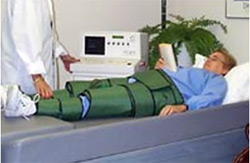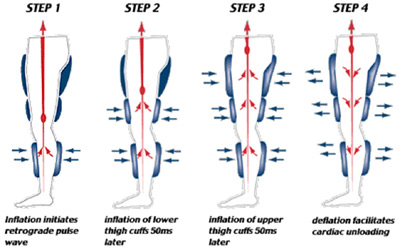 External Counterpulsation Therapy
External Counterpulsation Therapy, also
known as ECP, is a non-invasive treatment for chronic stable angina.
Chronic stable angina is defined as predictable symptoms (e.g. chest discomfort), usually with exertion, that occur as a
result of severe blockages in heart arteries. The symptoms can result in significant limitations for patients. Chronic
stable angina may be treated with medications, percutaneous coronary intervention coronary
artery bypass surgery, and in certain situations, ECP.
ECP, through the use of compression devices placed on the extremities, may improve circulation, increase coronary
artery blood flow, and increase production of natural substances in the body that can lead to improved blood vessel function.
In clinical trials, ECP has been found to reduce angina, improve exercise tolerance, and decrease stress-induced
ischemia in patients with severe coronary artery disease.
BCS Heart offers on-site ECP therapy.
For more detailed information about the procedure, continue reading below.

ECP Therapy typically consists of 1-hour treatments each day, 5 days per week, for a total of 7 weeks.
A standard treatment
session will invovlve a technician attaching compression devices to the patient's legs (calfs, lower thighs, and upper thighs).
These devices will inflate and deflate at timed intervals, triggered by heart beats, for the duration of the session.
The image on the right depicts the various inflation and deflation steps occuring with ECP.

 External Counterpulsation Therapy, also
known as ECP, is a non-invasive treatment for chronic stable angina.
External Counterpulsation Therapy, also
known as ECP, is a non-invasive treatment for chronic stable angina.
 ECP Therapy typically consists of 1-hour treatments each day, 5 days per week, for a total of 7 weeks.
ECP Therapy typically consists of 1-hour treatments each day, 5 days per week, for a total of 7 weeks.